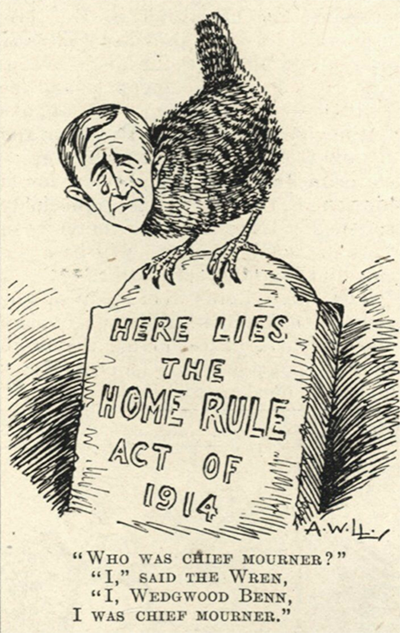7th July - No letter
Secret diary: Wed Bridge
Official diary (7th July): No entry for the 7th July
The British government were struggling to find a solution to the crisis in Ireland. Wilson recorded in his diary the various options that were being discussed at the time and the latest rumours being circulated about the fate of CHTL.
Harrington to Wilson War Office July 7 (1920)
…Just heard from Macready. He wants 3 more Battns.-a Brigadier vice Lucas & a complete Bde HQ for the South West. They want to divide S.W. into 2 Bde areas. I think we will send Livesay & staff temporarily & offer C in C a choice of some Colonels to act vice Lucas. The latest is that Lucas has gone on hunger strike! Had my old Cheltonian Dinner last night & made 2 speeches!
The Military Correspondence of Field Marshal Sir Henry Wilson 1918-1922 edited by Keith Jeffery Entry 135
Churchill’s memo read:
Brig Gen vice General Lucas
& additional Brigade Hqrs.
SECRETARY.
FINANCE MEMBER.
MILITARY SECRETARY.
It follows on the Cabinet design about Ireland that General Macready is to have what he asks for in regard to officers, personnel, material, etc., so far as we are able to supply it, and that the additional cost of this, over and above our normal estimates or establishments, is to form part of a separate account (not a separate vote) the recovery of which from Irish sources will afterwards be undertaken by the Government.
The Military Secretary is to be authorised with delay to make the appointments required, submitting them to me for sanction.
7/7/20
General Macready got his new brigadier to replace Lucas, although in retrospect he might have wanted a different candidate to have been offered the job.
Food Glorious Food
CHTL would not have been on hunger strike – not with all that good home cooking that he was getting from his hostesses and the more refined cuisine Miss Mulqueen served up! It certainly beat the gruel at his old school, Marlborough. As he himself described, his conditions were far from harsh and he had no complaints to do with his treatment to protest about:
"I am very comfortable, a good bed, lots of excellent food, and everyone very kind." Letter 5 written 4th July 1920
"Am getting fatter everyday" Letter 10 written on 13th July 1920
He was a man who enjoyed his food, writing to Poppy before they were married, CHTL described one of his ‘joy-rides’. A typical way of coping with the horrors of life at the Front in France, was for CHTL to make the most of the extra freedom he enjoyed as an officer and to sneak off into the French countryside and support the local economy by indulging in sampling the local cuisine. The following letter to Poppy from May 1917 paints a picture of his roller coaster life on the edge; his love for her, his ‘funny little fiancee’; his humour and his enjoyment of good food:
As regards clothes, I had no complaints last time I saw you in town although the only thing I noticed was that you wore black, you told me you had your mother’s fur coat on, and your veil was making a nuisance of itself in the park, also there was an argument between your skirts and the wind, so cheer up. I think I should notice if you wore trousers.
Some pressed vegetation fell out of your last letter but one, they might have been lily of the valley once, in spite of their tired appearance they showed me you were still in the right mood.
I haven’t much news. Today I went to 2 memorial services & a funeral so feel a little morbid.
Yesterday I made a beast of myself, having borrowed a car and found 2 congenial spirits we went 40 miles in search of a good lunch; the weather was perfect, the country lovely & there was only one thing missing. For lunch we had salmon chicken and green peas, asparagus, ices and strawberries, all fresh, and I brought a duplicate of everything including the mayonnaise sauce back here for our dinner in the evening. You still have time to break the whole thing off after this.
In a fit of industry the other day we collected a large pile of german gas shells that were lying about and stacked them near the entrance to our dug out; It is not as a rule a very noisy place but the germans at once pitched a big shell within 6 feet of them, which failed to send them off, otherwise it would have got a bit stuffy down below. The collection has since been handed over to safe keeping.
Letter, May 24th 1917
The thought of Poppy kept him going and gave him a focus and a determination to make it through whatever trouble he was in at the time. However a good meal would be an enjoyable distraction from what was happening.
Just after the fierce Battle of Cambrai, (the Battle of Cambrai, 20 November 2 to 4 December 1917 - an attack launched against the Hindenburg line in November 1917) where CHTL lost yet another of his 9 lives, he wrote to Poppy.
I went over to G.H.Q with De Lisle, & saw a lot of old friends. They were all very full of the recent fighting done by this divn. This morning Robinson & Gibbs, the correspondents of the Times & Telegraph were sent to me to get full details of the fighting. We had an extremely strenuous time the last fortnight & from Nov 30th to Dec 3rd a great deal of intense hand to hand fighting. I was personally not engaged in it, as I was directing all 3 brigades, while they were nearly cut off & the genl was organising counter attacks from behind to open up the gap again. At one time the Bosche came in from behind to within 100yds of our hd qrs & we all thought we were for Berlin but the bde hd qrs managed to keep them off till further assistance arrived. We were withdrawn on the right of the 2nd but on the third I had to go down again & help another brigadier as there was serious trouble on & he was rather done up. Some of the battns had a desperate time, & their behaviour was magnificent.
Well now, my old Pops, cheer up; it is all over & we are in comfort; a hot bath, & then fresh fish & roast duck for dinner.
Letter, 7th December 1917
Food served in captivity would have been very welcome. In the trenches it was a way of shutting out for a few minutes the horror of what was happening all around. In Captivity it would be a break in the boredom and a way of keeping CHTL’s mind focused on the positives. It would have generated happy, appreciative banter with those who served it. And no doubt the ‘platter was licked clean’!
Home Rule
The satirical publication, Punch, reflected on yet another delay to the Home Rule Bill, 7th July 1920, in a poignant cartoon.

On the 29th March the Government of Ireland Bill had been given it’s second reading. The Government of Ireland Act 1920 was an Act of the Parliament of the United Kingdom. The Act's long title was "An Act to provide for the better government of Ireland"; it is also known as the Fourth Home Rule Bill or (less accurately) as the Fourth Home Rule Act.
The Act was intended to establish separate Home Rule institutions within two new subdivisions of Ireland: the six north-eastern counties were to form "Northern Ireland", while the larger part of the country was to form "Southern Ireland". Both areas of Ireland were to continue as a part of the United Kingdom of Great Britain and Ireland, and provision was made for their future reunification under common Home Rule institutions.
Home Rule never took effect in Southern Ireland, due to the Irish War of Independence, which resulted instead in the Anglo-Irish Treaty and the establishment in 1922 of the Irish Free State.
Previously in 1914, because of the continuing threat of civil war in Ireland, King George V called the Buckingham Palace Conference in July 1914 where Irish Nationalist and Unionist leaders failed to reach agreement. Controversy continued over the rival demands of Irish Nationalists, backed by the Liberals (for all-Ireland home rule), and Irish Unionists, backed by the Conservatives, for the exclusion of most or all of the province of Ulster. In an attempt at compromise, the British government put forward an amending bill, which would have allowed for Ulster to be temporarily excluded from the working of the Act; this failed to satisfy either side, and the stalemate continued until overtaken by the outbreak of World War I. A few weeks after the British entry into the war, the Act received Royal Assent, while the amending bill was abandoned. However, the Suspensory Act 1914 (which received Royal Assent on the same day) meant that implementation would be suspended for the duration of what was expected to be only a short European war. https://en.wikipedia.org/wiki/Buckingham_Palace_Conference
Captain Wedgwood Benn had opposed the second reading for the following reasons:
HC Deb 29 March 1920 vol 127 cc925-1036
I submit that the form in which this Bill has been introduced is the very worst form in which a settlement could have possibly been outlined, because you deny all the things that are worth having to a sovereign Parliament. You deny them the power of the purse and the power to shape and control their trade.
…A late hon. Member of this House, Mr. Kettle, expressed, if I may venture to say so, very beautifully his conception of what his ideals of the War were, in a little poem which he wrote four days before he was killed:
“To my Daughter Betty—the gift of God.
Know that we fools, now with the foolish dead,
Died not for flag or King or Emperor,
But for a dream born in a herdsman's shed
And for the secret scripture of the poor.”
That was the fine ideal that inspired Irish patriots who went to fight for their country in the great world battle. This Bill denies them the main attributes of nationhood; it divides the country that they love; it erects and entrenches ascendency; it destroys their one charter of emancipation. For that reason I shall vote against the Second Reading.
It would be another 2 years of killings and fighting before the establishment of the Irish Free State in 1922. Tragically the fighting didn’t stop: a painful and very bitter Civil War broke out which saw former comrades fighting and killing each other. It lasted almost a year with several thousand more Irish men and women losing their lives, before peace finally settled on a war ravaged land.

